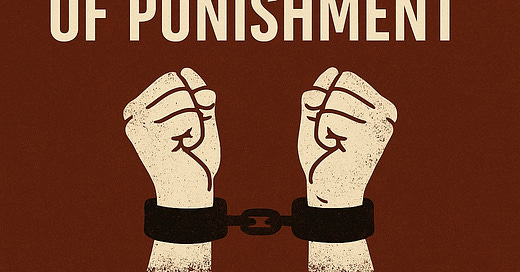The Projection of Punishment: Why Authoritarians See Empathy as a Threat
Post 7 in the Peaceful Resistance Series
When you’re not allowed to feel,
you learn to punish.
You don’t cry—you control.
You don’t process—you project.
You don’t admit pain—you find someone else to blame for it.
This is what happens when whole systems—religious, political, cultural—teach people that emotion is weakness and introspection is sin.
If you can’t face what’s broken inside you,
you will try to break it in someone else.
When You’re Not Allowed to Feel, You Learn to Punish
Authoritarian systems aren’t just built on rules.
They’re built on emotional restriction:
No tears.
No doubt.
No fear, unless it’s directed at enemies.
Boys are taught to suppress tenderness.
Women are told to suppress anger.
Anyone who shows pain is suspect—unless it can be turned into moral performance.
So where does the emotion go?
It doesn’t disappear.
It gets redirected.
Into rage.
Into judgment.
Into punishment.
That’s why systems that suppress empathy become obsessed with justice.
But not real justice—vengeance disguised as virtue.
The Guilt Loop: Why They Need You to Be the Sinner
Authoritarian systems don't just fear sin.
They need someone to represent it.
Because when you're raised to believe:
You are broken.
You are undeserving.
You must earn love through obedience…
But you also can’t question, can’t feel, can’t heal…
Then the pain doesn’t go away.
It just finds a target.
If they suffer but don’t grow, someone must pay.
And that “someone” becomes:
The queer kid.
The single mother.
The poor family.
The undocumented worker.
The protestor who won’t be quiet.
The woman who won’t sit down.
Because if you are the sinner,
then they get to be righteous.
They get to punish.
To control.
To dominate.
Not out of cruelty, but out of moral duty.
That’s the loop:
Pain → Suppression → Shame → Projection → Punishment → “Relief” → Repeat
And this is exactly why empathy is dangerous to the authoritarian worldview:
Because empathy breaks the loop.
It says maybe the “sinner” isn’t bad.
Maybe the rule was unjust.
Maybe the pain wasn’t deserved.
Maybe you didn’t deserve it, either.
And if they allow that thought in—
even for a moment—
the whole system cracks.
From Discipline to Dehumanization
“Love the sinner, hate the sin.”
That’s what they say.
But listen closely.
Watch their actions.
And you’ll see something else entirely:
Protestors called “vermin.”
Queer families labeled “groomers.”
Immigrants branded as “invaders,” “rapists,” “diseased.”
Liberals called “the real evil,” “communists,” “Satanic.”
Biden as “the antichrist,” Kamala Harris as “Jezebel.”
This isn’t “hate the sin.”
It’s hate the person—dressed up as righteousness.
Because if you really loved someone,
you wouldn’t lie about them.
You wouldn’t dehumanize them.
You wouldn’t justify cruelty in the name of compassion.
But that’s the trick authoritarian theology plays:
It teaches people that punishment is love.
That discipline is compassion.
That destroying someone might save their soul.
And so prisons multiply.
Programs are defunded.
Families are deported.
Rights are stripped.
And it’s all done with a cross in one hand
and a flag in the other.
Human Sacrifice by Another Name
Let’s call this what it is—
no matter how uncomfortable it sounds:
It is human sacrifice.
Not with altars or flames, but through systemic neglect, intentional cruelty, and the weaponization of morality.
Cutting school lunches to “promote personal responsibility” is a sacrifice of children.
Defunding healthcare in poor areas is a sacrifice of the sick.
Blocking clean water infrastructure is a sacrifice of entire communities.
Forcing women to carry doomed pregnancies is a sacrifice of autonomy—and sometimes, of life.
Leaving people unhoused and unfed while criminalizing their existence is a sacrifice of the poor.
All in the name of “holiness,” “freedom,” or “fiscal discipline.”
But what it really is—
A modern liturgy of death.
Ritualized suffering offered to the gods of control, wealth, and dominance.
This is not new. It is repackaged.
In Deuteronomy, cities were wiped out completely—man, woman, and child.
In Numbers, women and children were separated and slaughtered based on purity.
In the Inquisition, “heretics” were burned alive to purify the church.
In the Crusades, Muslims were killed for the “holy cause.”
Today we don’t call it sacrifice.
We call it policy.
But the blood still runs.
It runs in emergency rooms with no coverage.
In border camps without soap or heat.
In dark bedrooms where despair becomes unbearable.
In the silence after a child’s last school lunch was yesterday.
And when someone dares to call it cruelty,
they’re told it’s “God’s will.”No.
This is human sacrifice.
And it’s time we name it.




